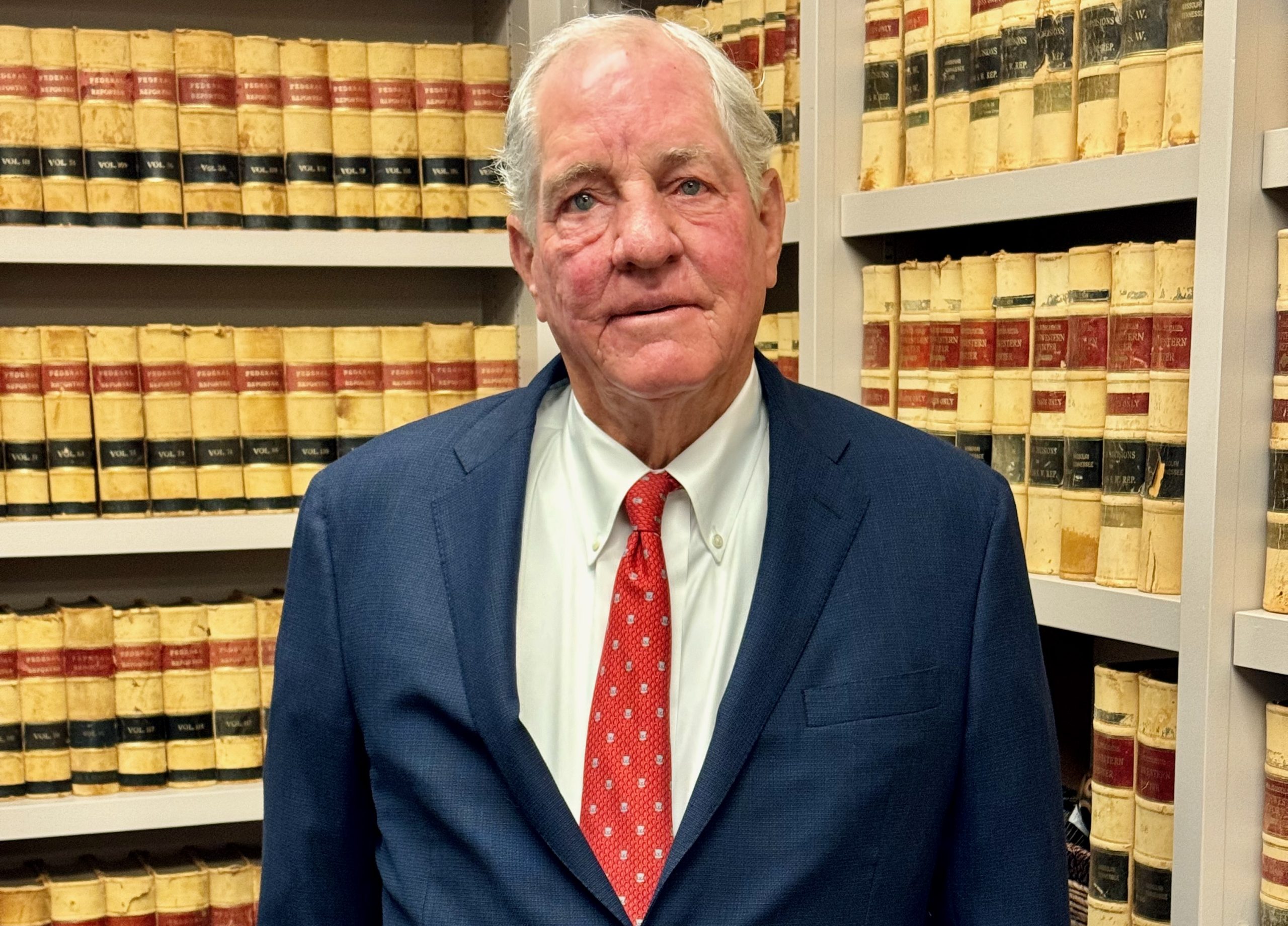When Kent Hale played NCAA Division I golf for the University of Arizona in the 1970s, he joined attorneys from a Tucson law firm for 18 holes.
“They told me I need to go to law school so I could play with their clients,” said Hale. A law firm having a former Arizona Wildcat practicing law would draw clients to the firm, the attorneys told him.
But Hale’s goal was to be a professional golfer.
He did become a lawyer – in his native West Texas, not Tucson – building a blended practice of litigation and transactional law over more than four decades that kept expanding into various areas of the law.
Now he’s joined the McCleskey Law Firm, adding his expertise in commercial litigation connected with the Uniform Commercial Code, agriculture and other areas.
Hale is admitted to practice in various federal courts, along with trying numerous jury and bench trials.
“Kent is very well known in the West Texas legal community, particularly in the areas of agricultural law and UCC litigation. Frankly, I’m not aware of another attorney in West Texas or beyond that can match his knowledge of and experience with the UCC. Further, his practical approach to solving clients’ problems fits right in with how the attorneys in our firm approach the practice of law. When we were presented with the opportunity to bring Kent under our roof, it was a no-brainer,” said McCleskey Attorney John Shanklin.
West Texas upbringing
Hale grew up on his family’s farm and ranch in Floydada. He started playing golf at age 11.
“That was six years after I started working,” on his family’s agriculture operation, Hale said joking, which had given him enough experience to know he didn’t want to follow his father’s path.
He wanted to follow Arnold Palmer’s path.
“I was small for my age. I liked athletics, but my size was a disadvantage,” Hale said, who now stands 6 feet, three inches.
His dad had bought a set of golf clubs for $100 from Buster Fluke, a barber who practiced in the basement of the Hemphill Wells Department Store in downtown Lubbock.
Fluke went on to build Treasure Island par-3 course where the 4th Street Walmart is now located.
The clubs sat in a closet for a while until Hale’s cousin – who’d played golf with his uncle – suggested they hit balls in the pasture. Hale’s family had a membership at the Floydada Country Club mostly to use the pool. Hale started playing golf at the course tucked into Blanco Canyon south of Floydada.
“I had an aptitude for it and just loved it,” Hale said.
After two years playing and studying at New Mexico Junior College, Hale joined the University of Arizona golf team, which then participated in the Western Athletic Conference. He got a degree in finance while also learning the dream of playing professional golf wasn’t reality.
“My last year I realized I was two or three years behind in experience, skill level and technique,” Hale said, even if he was good enough to shoot one-over par for 54 holes in Arizona State’s Sun Devil Invitational Tournament.
Hale joined a cousin in Houston to work in financial planning, but it didn’t work out.
“I moved back to Floydada to make sure I knew how to run the farm and ranch,” he said.
Two years later, he enrolled in the Texas Tech University School of Law.
“My dad said he didn’t think I should go into farming and ranching even though we had a perfect facility because he didn’t think the risk/reward was there. He said I should go to law school which just happened to coincide with me deciding to go to law school because I knew I didn’t want to farm,” Hale said.
The original plan, amended, then amended again
Hale planned to practice estate tax and estate planning after graduating Tech’s law school, a nod to his original plan to do financial planning. But there were no positions available in that area of practice at the time. He went to work for an attorney he clerked for and “accidentally” got into commercial law working for lenders in the manufactured housing industry.
“I helped them secure their collateral and defended cases for them,” Hale said.
That allowed him to learn about defending deceptive trade practices, people suing because they felt they got a bad deal on their manufactured house.
I represented lenders, dealers and manufacturers – companies that financed the homes, sold the homes and built the homes,” he said.
Agricultural law was the next piece
Hale knew the agriculture industry.
“Pretty much from top to bottom. From the inception of cotton being planted, all the way to it being sold to cotton mills. It made it easier for me to work in this area because I knew the industry. I’ve done a bunch of work in cotton litigation, cattle litigation and other farm product litigation as well as drafting documentation relating to the agricultural industry,” he said.
The agriculture work also opened real estate.
“Agriculture is always real estate based, so I have a significant amount of experience in the real estate legal area,” Hale said.
Along the way he formed corporations, limited liability companies and limited partnerships.
Becoming an expert on the UCC
Many different areas of practice Hale added over the years involve the Uniform Commercial Code, which he studied at Tech law under the late John Krahmer –one of the country’s UCC experts.
Hale told a story about Krahmer.
“A practicing attorney and former student called to ask John a question about the UCC. He told the former student he’d have to do some research and would get back to him. He and took nap, got up, called and told him answer. John’s son asked if he knew the answer, why did he tell the former student he’d need to do some research? John told him, ‘I didn’t want him to feel bad I knew it off the top of my head and he didn’t,’” Hale said.
Another Krahmer story, according to a 2018 story in the law school’s magazine:
A law school student taking a Contracts class from Krahmer had a question about the UCC when he saw the professor in the hallway.
Krahmer answered, saying, “What I was going for … ” before he gave the answer.
The student quickly realized Krahmer wrote the section in question.
Krahmer – who joined the School of Law faculty in 1971 and was the longest serving faculty member – was known as “Mr. UCC.”
Hale and Krahmer had a professional relationship over the years.
“John was remarkable. He continued to teach me about the UCC,” Hale said.
The UCC is a comprehensive body of law dealing with the sale of goods, checks and other payments for those goods and how they go through the banking system.
That led Hale to UCC’s Article 9 – about secured transactions and protecting a company’s rights on loans and collateral.
“An easy example is buying a car and the financing on that transaction,” Hale said, adding if someone doesn’t make payments, “they can come get your car.”
This led Hale to do work on fraudulent and altered checks with the banking industry.
He’s also done a lot of bankruptcy work, representing creditors.
Volunteer work
Hale’s also volunteered to help his profession, for example:
- Member, State Bar of Texas Foundation
- Consumer Law Council for Consumer Law Section of State Bar of Texas
- Exam Committee for Consumer Law Section of State Bar of Texas
- Supreme Court Task Force for Revision of Ancillary Rules of Texas Civil Procedure (enforcement provisions regarding collateral and obtaining monies from defendants.)
- Member of the Independent Bankers Association of Texas Uniform Commercial Code Committee, which advises on amendments and comments to the UCC.
In the community, Hale has been:
- Chair, American Heart Association Board in Lubbock
- Former board member Make A Wish
- Former board member Lubbock Chapter of American Kidney Foundation.
- Trustee on First Presbyterian Church board.


